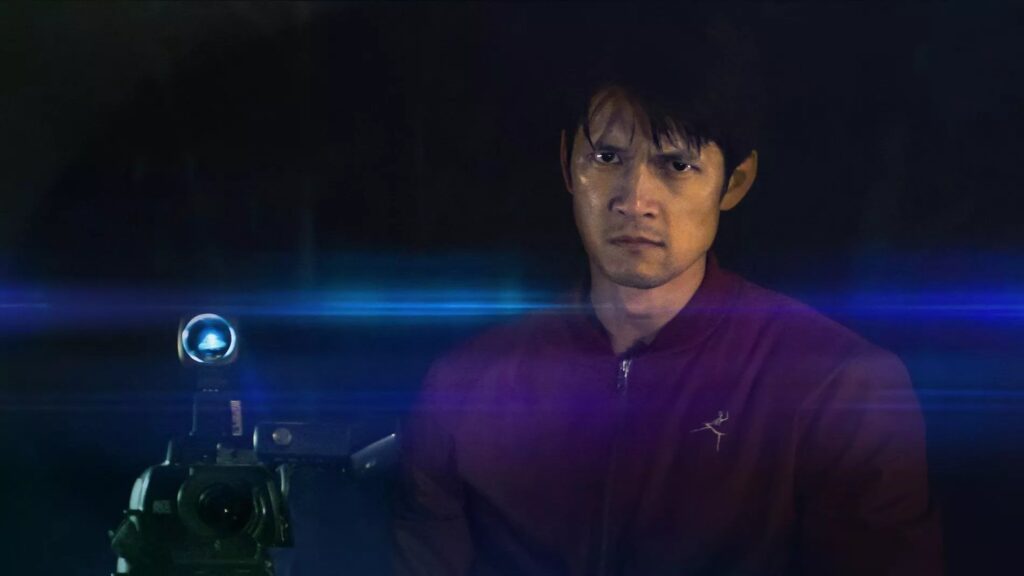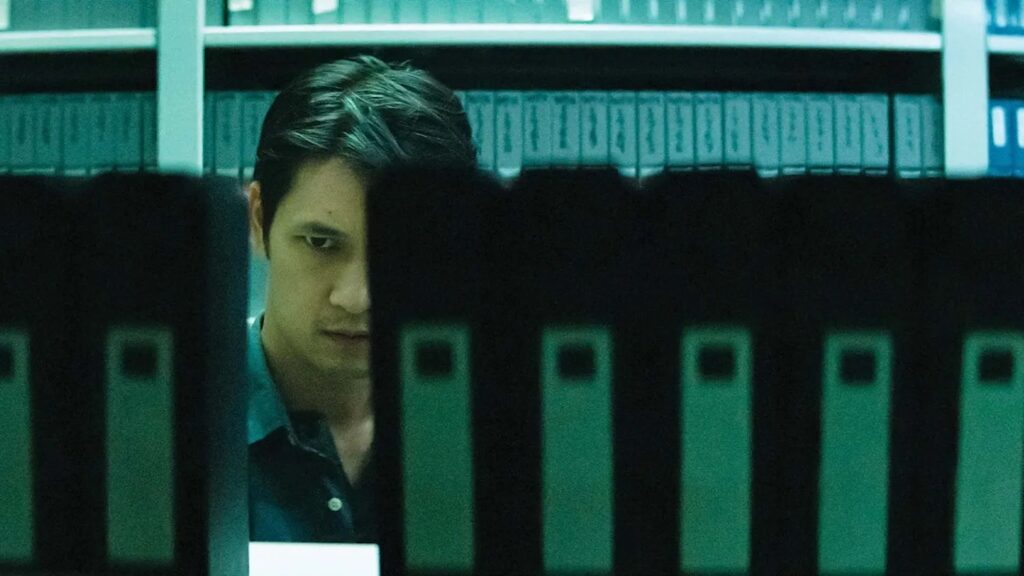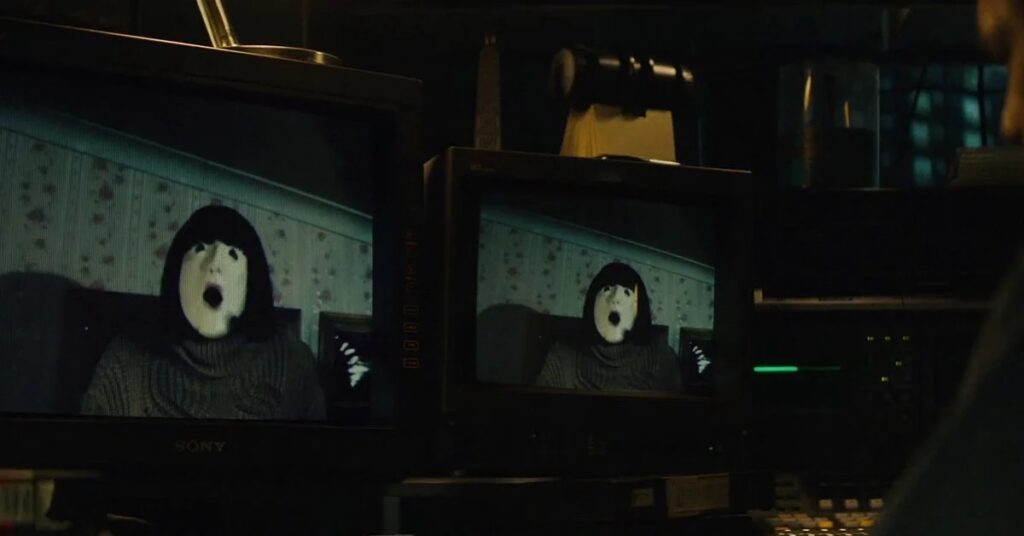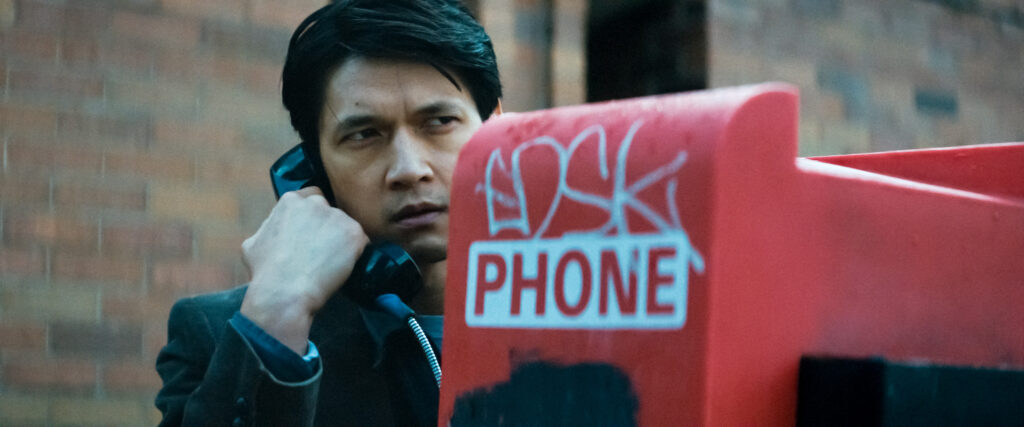Set in the late 90s, Broadcast Signal Intrusion follows a video archivist as he unearths a series of sinister pirate broadcasts and grows obsessed with uncovering the conspiracy behind them.
As the character searches for a connection between the tapes and the disappearance of his wife, the audience is all-too quick to fall down the rabbit hole with him. Yet, depending on individual interpretations of events, the film’s chilling conclusion may leave viewers with more questions than answers.
Following the UK release of Broadcast Signal Intrusion, Outtake sat down with director Jacob Gentry for a spoiler-filled chat about the movie’s disturbing and ambiguous ending.
*Please note that the following interview involves spoilers for Broadcast Signal Intrusion*

One of the first things I did after watching the film was head to Reddit to see what people were saying about the ending. Have you read any of the theories?
Jacob Gentry: No, not yet. It’s cool that people are engaging with it, though it’s kinda ironic given that the film is one giant “stay off the message boards!” [laughs] I mean, James [played by Harry Shum Jr.] is given a way out. All of the bad stuff that happens could have been avoided if he had gone for dinner with the lady at the support group. She is offering him a chance at a life, to move on. Obviously we wouldn’t have a movie if he does, but it is that point of no return – like the Harbinger at the petrol station in a horror movie who warns the kids that loads of people have been killed up in the woods, and then they drive on up there anyway. Once James responds to that message on the chat room, his fate is sealed.
The central mystery and the potential ambiguity around the ending are reminiscent of films like Under The Silver Lake and Blow Out. Is the conspiracy theory genre a favourite of yours?
Jacob Gentry: Absolutely. Growing up, I loved films like The Parallax View, Klute, The Conversation. Blow Out I must have seen about 20 times. Under The Silver Lake is an interesting one – it was one that I did not like when it ended, but then on the ride home and later on, we could not stop talking about it, theorising about it, etc. That’s when you realise that the film has done its job. It just burrows into your mind and stays there.

James is unable to grieve the loss of his wife. He has unanswered questions about her, about the way she died or disappeared and their relationship. The problem for characters like that is that, inevitably, they can end up searching for answers in the wrong places.
Jacob Gentry: It is interesting because the answers are there if you are willing to look for them. There is mention of an “abandoned car”, a “bridge”, and “no note” so you can certainly draw conclusions from that.
He is a little reminiscent of Leonard Shelby from Memento, a man who lost his wife and has re-written his past to create a puzzle he can never truly solve.
Jacob Gentry: Yeah, definitely. The answers are there but, if he and the audience are unwilling to accept them, then that can lead to some unhealthy places.
Like the lead character in The Vanishing (Sporloos) for example! You certainly become invested in James’s search for answers but ultimately are also complicit in his actions towards the end of the film. You are screaming at him to stop because there is enough ambiguity as to what the truth is.
Jacob Gentry: Harry Shum Jr. is a fantastic actor and was really able to draw you into James’s journey. Plus, he is in every scene of the movie. You are with him every step of the way but at the same time, you are only getting the story from his point of view. This is a guy who continually complains that he can’t sleep yet we are always seeing him waking up from a dream or a nightmare, so…
Ah, the unreliable narrator syndrome. Enid in Censor also gives the audience that singular forced, but questionable, perspective. It’s a film that would make a great double bill with Broadcast Signal Intrusion, given the themes and links to the analogue video world.
Jacob Gentry: I haven’t seen Censor yet, but it is on my list. Dan Martin, who did the effects for our intrusions, would talk to me about it as he worked on the one as well.

Speaking of those – with that final shot where James sees one of the animatronics, it feels like you inserted your own broadcast signal intrusion into the film, something to send audiences down the rabbit hole once the credits rolled. Can you tell us more about that?
Jacob Gentry: It is interesting, because the only other time that he sees the animatronics outside of the videos is during a dream. Now dreams are open to interpretation, and everyone can have a different interpretation, so… [chuckles].
Okay, preserving the mystery. Now obviously as the director, you have a definitive answer as to what happened. However, it is interesting to read fan theories because the film has so many clues or potential red herrings that, like James, you can develop some wild ideas and seemingly back them up by reading far too much into a shot of a hat, or the title of a video cassette. Did you purposely leave little clues and threads for viewers to pull on?
Jacob Gentry: That was definitely part of the plan. Obviously you want to make a film that audiences can enjoy when they first watch it, but also have something for people who go back for repeat viewings.
I haven’t really had the chance to talk about the ending in much detail or go into spoilers as we have been on a staggered release. We came out in the States in October then now in the UK. I’ve had to bite my tongue a bit, you know… so let me turn it back on you. What do you think happened?
I had a lot of theories, but even more now after talking with you. Is it possible that James killed his wife and blocked out the memory because it was too traumatic? Also, The Phreaker [Chris Sullivan] was definitely up to something with the noises in the attic. Was there an abducted person up there? Then there’s the man in the house at the end, but I don’t think he was responsible.
Jacob Gentry: Do you think that guy made the videos? I mean, he has all the stuff there, right?
I didn’t think he could have done it alone. There is the bit with the phone ringing in the house and he mentions his dad will be back soon. They could have been in on it together. There is also that moment when his voice changes during the confession scene, similar to something John Carroll Lynch did in Zodiac when he says “even if I was the Zodiac, I wouldn’t tell you”. Either he is accepting his fate and telling the truth or he’s resigned to the fact that James is going to kill him and tells him what he wants to hear.

Jacob Gentry: Ah, you caught that! Yeah, that was something we worked on with the actor [Justin Welborn], the timing of when that mask seems to slip. Of course, the question is, did he have anything to do with James’s wife? It’s only after the mention of a third broadcast releasing around the time of his wife’s disappearance that he starts to link the two – but are they actually connected? A character says “don’t mistake conspiracy for coincidence,” and that sentence really encapsulates James’s undoing.
Absolutely. In many ways it’s better not having everything wrapped up in a neat little bow. Like the film, you have left me with more questions than answers, so well played. Time to log back onto Reddit.
James Gentry: It’s great to know that it has this life beyond the movie and people are engaging with it.
I will need to chat to you again and present some of the online theories for you to rank on their plausibility [laughs].
Jacob Gentry: That could be a lot of fun.
Right, I’m off down the rabbit hole…
Broadcast Signal Intrusion is out in UK cinemas from March 25th, and on Blu-Ray and Digital from March 28th.
